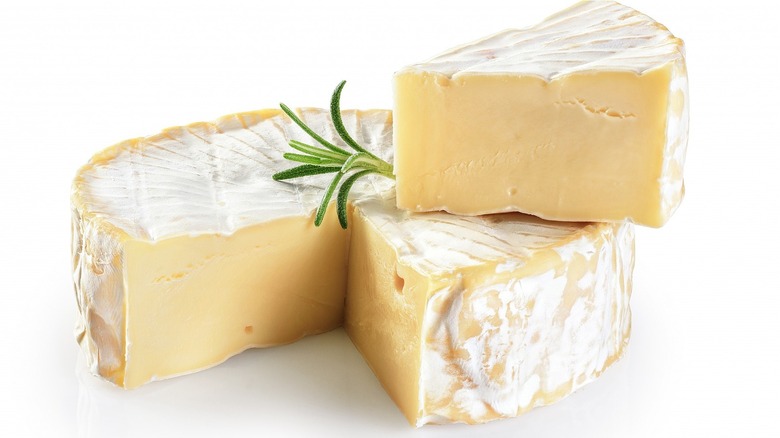What You Need To Know About The Massive Brie And Camembert Recall
Good cheese can do so much for you, and Camembert or Brie are certainly good cheeses. A simple baked Brie recipe will upgrade your evening and a Camembert and pear salad will make eating your veggies feel more like an indulgence than a penance. Plus, cheese is rich in calcium and protein, and Camembert also happens to be rich in phosphorous and surprisingly high in selenium (per Self). Camembert's creamier cousin, Brie, brings home the B vitamins with substantial amounts of B12, riboflavin, and folate, and lesser amounts of B6, pantothenic acid (B5), and niacin (B3), as well as some of the same phosphorous and selenium benefits as Camembert, just to a lesser degree (via Self and Harvard School of Public Health). So there's more to these buttery, bloomy-rind cheeses than just high fat content.
But while they may be healthier than you might think, at the moment, there's a significant health risk associated with consuming Brie and Camembert cheese, and no, it's not high cholesterol.
Massive recall of Old Europe cheeses
The current risk to consumers is a massive recall of Old Europe cheeses due to potential Listeria contamination. You may think, "I've never bought that brand; I don't need to worry." Not so fast. Old Europe is a supplier, and a major one at that, so chances are, if you've bought Brie or Camembert in the U.S., you've bought Old Europe at some point. The recall affects 24 brands, including major players La Bonne Vie, Joan of Arc, and Primo Taglio, as well as store brands like Taste of Inspirations, Trader Joe's Slicing Brie, and Target's new grocery brand Good and Gather (per FDA).
The list of brands affected is so broad that if you've purchased Brie or Camembert with a best-by date between September 28, 2022 to December 14, 2022, the FDA advises that you throw it away as the product may have been repackaged at the grocery store and no longer bears the identifying packaging. This is particularly true if you bought store-wrapped cheese from Stop & Shop, Save Mart, Giant Foods, Fresh Thyme, Safeway, Lidl, Albertsons, Sprouts, Meijer, Athenian Foods, Shaw's, Market Basket, Price Chopper, Raley's, Harding's, and Whole Foods.
While the contamination was actually found in the facility and not in sampled cheese, Old Europe shut down production until the problem can be fully eradicated. The FDA urges anyone who purchased Brie or Camembert within the suspect best-by dates to use extra caution cleaning containers and surfaces the cheese may have come in contact with, including the inside of your refrigerator, as Listeria can spread to other foods.

